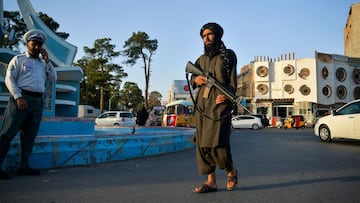Why are Afghan women judges in hiding in Afghanistan and how are they being protected?
Hundreds of former female judges trapped in Afghanistan are hiding while they try to escape the country now in the hands of the Taliban regime.

The US managed to evacuate over 79,000 civilians from Hamid Karzai International Airport over an 18-day period General Kenneth F. McKenzie Jr, commander of U.S. Central Command, said at a press briefing 30 August. A few dozen female judges were able to flee Afghanistan after the Taliban took control of the country in mid-August, but hundreds more were left behind when the last US military personnel withdrew from the country 31 August.
The return of the Taliban meant that the 250 women judges in Afghanistan were removed from their posts, along with their male counterparts, and replaced with Taliban appointees. The hundreds who haven’t been able to get out are now hiding, fearing reprisals from the Taliban and criminals they put in jail who are now on the streets free again.
Also see:
- Officials promise to be "fully transparent" about drone strike which killed ten Afghan civilians
- Pentagon admits Afghanistan drone strike which killed 10 civilians was a “horrible tragedy”
- Texas border crisis poses headache for Biden
- SpaceX Crew Dragon returns to Earth: who are the all-civilian crew?
Female judges receiving threats
When the Taliban took control of Afghanistan, besides ordering women not to return to work including 250 female judges, the fundamentalist regime opened prison gates. Many of the convicted criminals, including rapists and murderers, were put there by female judges who presided over cases of violence against women. This has led them to not only fear reprisals from the Taliban but also revenge against them and their families from those they put away.
"Now we do not feel safe; the same criminals are going after my own life, the lives of my family. God forbid if they seek revenge," one of the former judges going by the name Nabila to protect herself and her family told CNN.
Many judges fled their offices in such a hurry as the Taliban entered Kabul that they didn’t have time to clean them out, leaving personal information and photographs behind, material which is now being used to track them down. Shortly after the Taliban arrived in Kabul Nabila said “my personal number was called and I was threatened with revenge, threatened with murder." Since then, she has cancelled her phone numbers and has been changing houses every few days with her family.
Afghan women are lobbying and advocating in every corner of the world. One of them is the non stop advocacy for Female Judges stuck in Afghanistan by @marziababakarkh https://t.co/ztQRmHdmkB
— Samira Hamidi (@HuriaSamira) September 15, 2021
Efforts being made to evacuate the female judges
A number of organizations are trying to find safe passage out of Afghanistan for the female judges who are at special risk due to their gender. Judge Vanessa Ruiz from the International Association of Women Judges (IAWJ) based in the US told CNN the convicted criminals now roaming free would be especially angry with a woman judge “a woman [that] had official authority, and sat in judgement of a man, is rage of a completely different order,” Ruiz said.
The IAWJ, whose resources are limited, are doing all they can to get female judges out, but want to see Western countries do more, in particular the US. Several of the female judges were trained through a judicial education program funded by the US government.
"It's their association with us, in many ways, that puts them at risk," said Ruiz. She wants Western governments to be more agile and generous admitting those in danger in Afghanistan saying "You've got to cut the red tape when you're dealing with an emergency, and we're dealing with an emergency."
📢 Time and again the @IajUim and the #IAWJ have denounced the terrible threats pending against our colleagues in #Afghanistan 🇦🇫
— International Association of Women Judges (@IntlWomenJudges) September 20, 2021
We urge the global community to work together to save the lives of the Afghan judges ⚖️
See our full joint statement here ⤵️ https://t.co/Jl60fsZed4
The US continues to evacuate Afghans and Americans
Related stories
Even though all US forces left Afghanistan, there are ongoing efforts to evacuate more people. Secretary of State Anthony Blinken told a Senate Foreign Relations committee hearing last week that two flights left Kabul in the prior two weeks and efforts to get people out would continue as long as necessary. "There's no deadline to this mission," Blinken said. "We will continue to help Americans -- and Afghans to whom we have a special commitment -- depart Afghanistan if they choose.”
Judge Ruiz said that the IAWJ as well would continue their efforts to get out “every woman judge who is threatened, and wishes to leave Afghanistan,” until every last one is able to do so. She added "We're not going to abandon them. We're not going to forget them. And we're not going to let the world ignore them."


